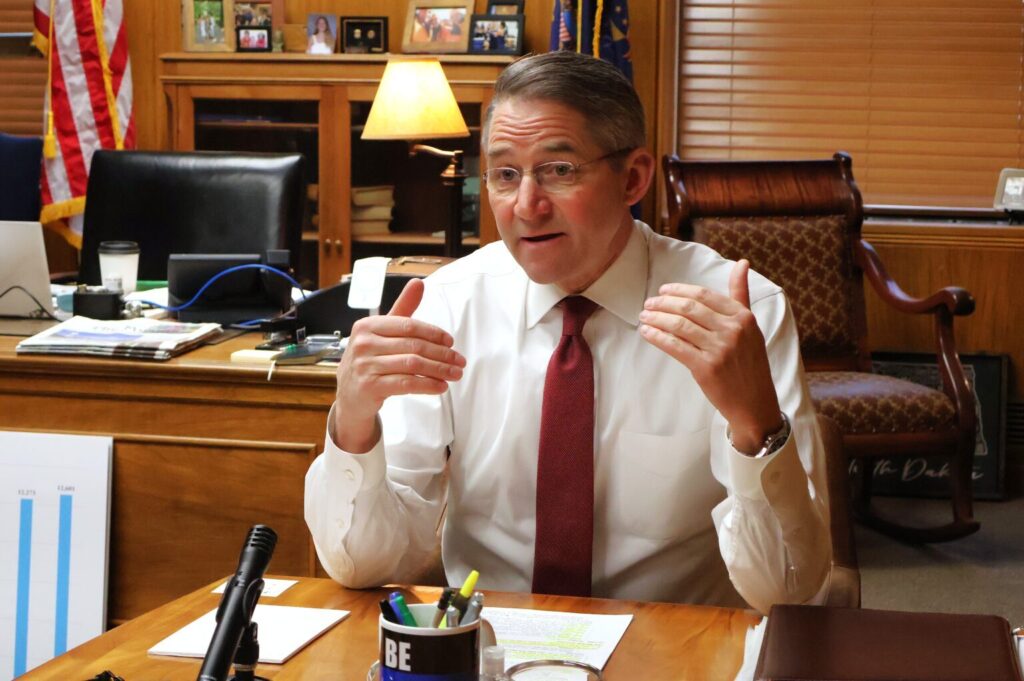North Dakota Attorney General Drew Wrigley speaks in his office about a Truth in Sentencing bill on March 5, 2025. (Photo by Michael Achterling/North Dakota Monitor)
Supporters of South Dakota’s law barring the use of eminent domain for carbon dioxide pipelines are pushing back after North Dakota’s attorney general suggested his state might challenge the measure in court.
In an interview published Thursday, Fargo radio station The Flag (WZFG) asked North Dakota Attorney General Drew Wrigley if he would file a lawsuit against South Dakota. Wrigley said his office is “examining all possibilities.” He also criticized South Dakota’s law, calling it a “bad policy choice” and a “hostile act.”
“To have a nation, you have to have commerce between, around and across states,” Wrigley said. “There are limitations on what one state can do that then would make them the regulator of the nation, so to speak.”
More pipeline news
See our full archive of carbon pipeline coverage.
The South Dakota legislation, signed into law in March, prohibits the use of eminent domain for carbon pipeline projects. Eminent domain is the legal right to access private property for projects that benefit the public, with compensation for landowners determined by a court. It’s commonly used for projects such as electrical power lines, water pipelines, oil pipelines and highways.
The change effectively blocked Iowa-based Summit Carbon Solutions from constructing its proposed $9 billion pipeline across South Dakota to connect ethanol plants in that state, as well as Minnesota, Iowa and Nebraska, with plants and an underground storage site in North Dakota. The project would capitalize on federal tax credits incentivizing the prevention of heat-trapping emissions into the atmosphere.
Summit has since sought to remove language from its Iowa permit conditioning the start of construction on approvals in the Dakotas. The project has permits not only in Iowa but also in North Dakota and Minnesota, while Nebraska has no permitting process for the project and South Dakota regulators have twice rejected Summit’s applications. Summit did not immediately respond to a request for comment Friday.
South Dakota’s Speaker of the House, Rep. Jon Hansen, R-Dell Rapids, criticized Wrigley’s comments. Hansen, one of several candidates for governor next year, was one of the sponsors of the eminent domain ban and voted for it. He is campaigning with his running mate, Rep. Karla Lems, R-Canton, the bill’s prime sponsor in the House.
“Let’s call this what it is,” Hansen wrote on social media. “It appears the carbon pipeline lobbyists have found their latest puppet — and now North Dakota taxpayers might be forced to bankroll a lawsuit against their own neighbors in South Dakota, all to help a private carbon pipeline company.”
Pipeline opponents call for Iowa regulators to reject Summit’s proposed permit changes
Sen. Mark Lapka, R-Leola, the bill’s prime sponsor in the South Dakota Senate, defended the legislation. He said the bill “in no way, shape or form” prevents a carbon pipeline from being built in South Dakota but instead gives landowners an option.
“They now have the ability to choose whether they want to participate in something, or — if it does not work out for their best interests — they have the opportunity to say no,” Lapka said.
Republican South Dakota Attorney General Marty Jackley’s office would be responsible for defending the state if a lawsuit is filed.
“I will defend the laws and people of South Dakota, it’s as simple as that,” Jackley said in a statement to South Dakota Searchlight. “The Legislature voted for the private property rights by wide margins, and Gov. Rhoden signed it into law. The people of South Dakota voted decisively on this issue, and I will support them.”
Republican South Dakota Gov. Larry Rhoden’s office referred Searchlight to a letter he sent legislators in March explaining his decision to sign the bill. The letter referenced “easements,” which are land access agreements, and made a distinction between voluntary easements and the involuntary kind that could come with eminent domain.
“South Dakota landowners feel strongly that the threat of involuntary easements for the proposed carbon dioxide pipeline infringes on their freedoms and their property rights,” Rhoden wrote in the letter.
GET THE MORNING HEADLINES.


